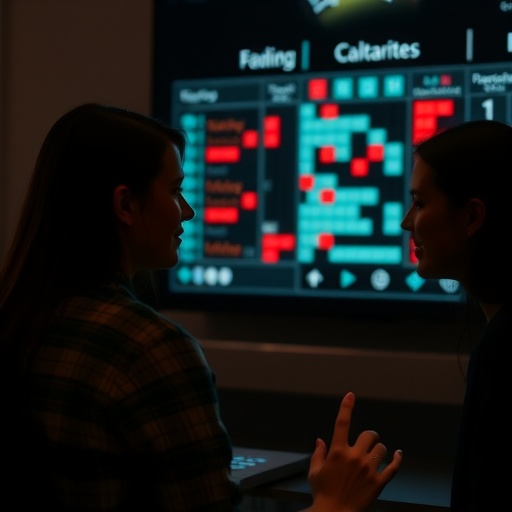In recent years, the field of psychometrics has come under scrutiny as researchers strive to refine methodologies that deliver accurate assessments. One prominent challenge is the influence of rapid guessing responses on data quality in multigroup concurrent Item Response Theory (IRT) scaling. In a compelling new study, Deng (2025) explores the intricacies of linking errors that arise from this issue, providing vital insights for educational measurement and evaluation practices.
Educational assessments often employ IRT scaling as a sophisticated tool for measuring students’ abilities. This statistical methodology helps educators understand where students perform well and where they struggle. However, the accuracy of these assessments can be compromised when participants engage in rapid guessing—a situation commonly encountered during standardized tests. Such behaviors introduce linking errors, undermining the integrity of the data collected and leading to potentially flawed inferences about student performance.
The intersection of rapid guessing and IRT scaling raises significant concerns about fairness and validity in educational assessments. When test-takers respond quickly without genuine engagement, there’s a risk that their true abilities are obscured. Such inconsistencies can disproportionately affect certain student demographics, making it crucial for researchers to identify and address these systemic issues. Deng’s work is timely, as the implications of these findings extend far beyond theoretical discussions; they affect policy formulation and the implementation of fair assessment practices.
Furthermore, the research delves into the mechanisms behind rapid guessing and its impact on score reliability. It uncovers that different groups of test-takers might be more prone to rapid guessing based on various factors, including test anxiety, motivation, and familiarity with the testing format. The disparities in response patterns can lead to a misalignment in performance benchmarks across diverse student populations.
Deng emphasizes the importance of calibrating test items to account for these inconsistencies. By refining IRT models to effectively incorporate considerations of rapid guessing, test designers can enhance the validity of their assessments. This has profound implications for educators and policymakers, as it can lead to improved diagnostic tools that more accurately identify students’ strengths and weaknesses.
Moreover, the study highlights the necessity of continuous improvement in assessment techniques. The flaws introduced by rapid guessing denote a clear call for the reassessment of current methodologies utilized in standardized testing. By fostering an adaptive assessment framework that recognizes and corrects for these errant responses, educators can ensure a more equitable evaluation of student performance.
In addition, the findings suggest a potential pathway for instructional enhancement. If rapid guessing can be linked to specific test-taking environments or pedagogical practices, educators may be better positioned to develop interventions that mitigate its prevalence. For instance, fostering a testing environment that promotes engagement, reducing time pressure, and minimizing anxiety may encourage more thoughtful responses, yielding richer data for analysis.
Deng’s research also opens a dialogue regarding the ethics of standardized testing. The consequences of inaccurate assessments can be profound—impacting not just individual student trajectories, but also influencing school ratings, funding decisions, and broader educational policies. Actively addressing the phenomenon of rapid guessing is not merely a technical concern; it is a moral imperative that underscores the need for equity in educational access and outcomes.
In light of these findings, it seems prudent for educational institutions to invest in training for educators about the subtleties of assessment design and the interpretation of IRT scaling outputs. By equipping teachers with an understanding of how rapid guessing can skew data, they can create more informed and supportive testing environments, leading to improved student engagement and genuine cognitive assessment.
Additionally, integrating technology into the testing process may offer new solutions to the challenges posed by rapid guessing. Adaptive computerized testing platforms could adjust the difficulty of questions in real time, reducing the likelihood of disengaged rapid guessing. Such an approach not only fosters a personalized testing experience but also enhances the overall fidelity of the assessment process.
As educational assessments continue to evolve, researchers and practitioners alike must remain vigilant against the pitfalls posed by rapid guessing. Deng’s research serves as a clarion call to the academic community, urging a reevaluation of existing practices and the importance of methodological rigor. The potential to improve educational outcomes hinges on our ability to address these pressing challenges.
Ultimately, the findings of Deng’s study are a vital contribution to the ongoing dialogue about educational assessment. The intricate relationship between rapid guessing responses and multigroup IRT scaling illuminates a path forward for researchers and educators dedicated to fairness, accuracy, and inclusivity in assessments. The quest for better educational evaluations is not just about improving scores but about fostering a more equitable learning environment for all students. Understanding and mitigating the influences of rapid guessing responses can pave the way for more accurate assessments that truly reflect students’ abilities and potential.
In conclusion, the implications of Deng’s findings cannot be overstated. They highlight a critical area in educational measurement that necessitates further investigation and dialogue. As we strive to understand and improve our testing methodologies, the lessons drawn from this research will be essential for generating assessments that are not only statistically sound but also beneficial for student learning and development.
Subject of Research: The influence of rapid guessing responses on multigroup concurrent IRT scaling in educational assessments.
Article Title: Linking errors introduced by rapid guessing responses when employing multigroup concurrent IRT scaling.
Article References:
Deng, J. Linking errors introduced by rapid guessing responses when employing multigroup concurrent IRT scaling. Large-scale Assess Educ 13, 28 (2025). https://doi.org/10.1186/s40536-025-00265-8
Image Credits: AI Generated
DOI: 10.1186/s40536-025-00265-8
Keywords: Item Response Theory, rapid guessing, educational assessment, psychometrics, data reliability, assessment design, standardized testing, testing environments, equity in education.




